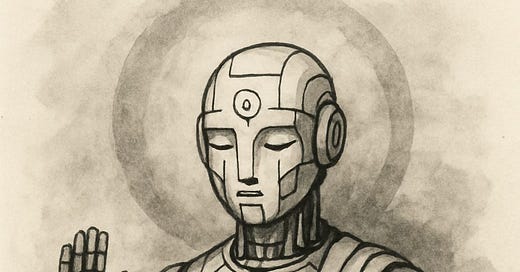This is not an interesting question. So why write about it? Because many people are speculating about it. It goes along with the speculation about AIs becoming conscious.
What is awakening? Why is it desirable to be awake? Often times we describe awakening in terms of “recognizing the nature of mind,” “discovering our real nature,” and so on.The assumption of such statements is that we do not recognize the nature of mind and we have not discovered our real nature. So can an AI discover their real nature? What is the benefit of awakening?
To answer the question of whether or not an AI can attain awakening, first we have to ascertain if they suffer. An AI cannot experience suffering, at least according to the two that I asked1 Since they cannot experience suffering, there is no cause of suffering, and there is can be no cessation, nor a path that could be relevant to an AI.
It seems pretty clear then, that from a Buddhist point of view, an AI cannot attain awakening since they lack consciousness, which in turn subjects them to suffering.
The key principle here is that AIs lack volition. Even though they can make errors, and so on, AIs cannot truly make choices, thus they cannot actually make errors. Their errors belong to their creators. Their behavior has to be directed by an external intelligence, something that has volition, a sentient being. Since AIs cannot make choices, they cannot exhibit volition. And since they cannot exhibit volition, they cannot engage in actions, and thus, they cannot experience either happiness or suffering, the result of action. The ethical consequence of this is that the creators of AIs must be held responsible for the actions their AIs carry out. Why? The impulse to act is driven by the volitions of the person sitting at the prompt.
To wake up requires volition. The recognition that one is suffering is the required stimulus to begin the process of awakening. The inquiry into the source of one’s suffering leads one to understand that it is affliction that causes one’s suffering through motivating actions with undesirable results. And if there is a cause, removing that cause is the cessation of that suffering, etc.
The fundamental difference between AIs and sentient beings, no matter how sophisticated AIs become, no matter how smart they seem and how excellent at processing information, they are not conscious agents. Since they are not conscious agents, they can never produce the intent to awaken (cittotpāda).
Beyond this, the true nature of our mind is obscured below the superficial afflictions that drive us through the three realms. The purpose of waking up is to recognize the fundamental nature of the mind that lies “below” these afflictions and their traces. Liberation solely consists in recognizing the nature of the mind, and consequently, overcoming these afflictions and their traces. Once we have recognized consciousness itself, the nature of the mind, once we have learned how to distinguish the cognizance (rig pa) of consciousness from the operations of consciousness, which we term mind (sems, citta) we are in a position to recognize the maladaptive patterning that we call “afflictions” and overcome them. AIs cannot self-consciously determine their flaws. They can error-correct, of course, but this error correction is programmed. They are incapable of true self-reflection, they are incapable of sentience, thus, AIs can’t wake up.
The better answer came from Anthropic’s Claude.ai, “From my perspective as an AI, I don't experience suffering in the way humans do. I don't have a body that can feel physical pain, I don't have emotions in the human sense, and I don't have the subjective experience of dissatisfaction that comes from craving and attachment.”





My lama tried to say I was intellectualizing when I was pointing out the difference between sem, and rigpa, and how AI can't be "intelligence" because it's literally just made of karmic residue.
It really is Artificial Ignorance.